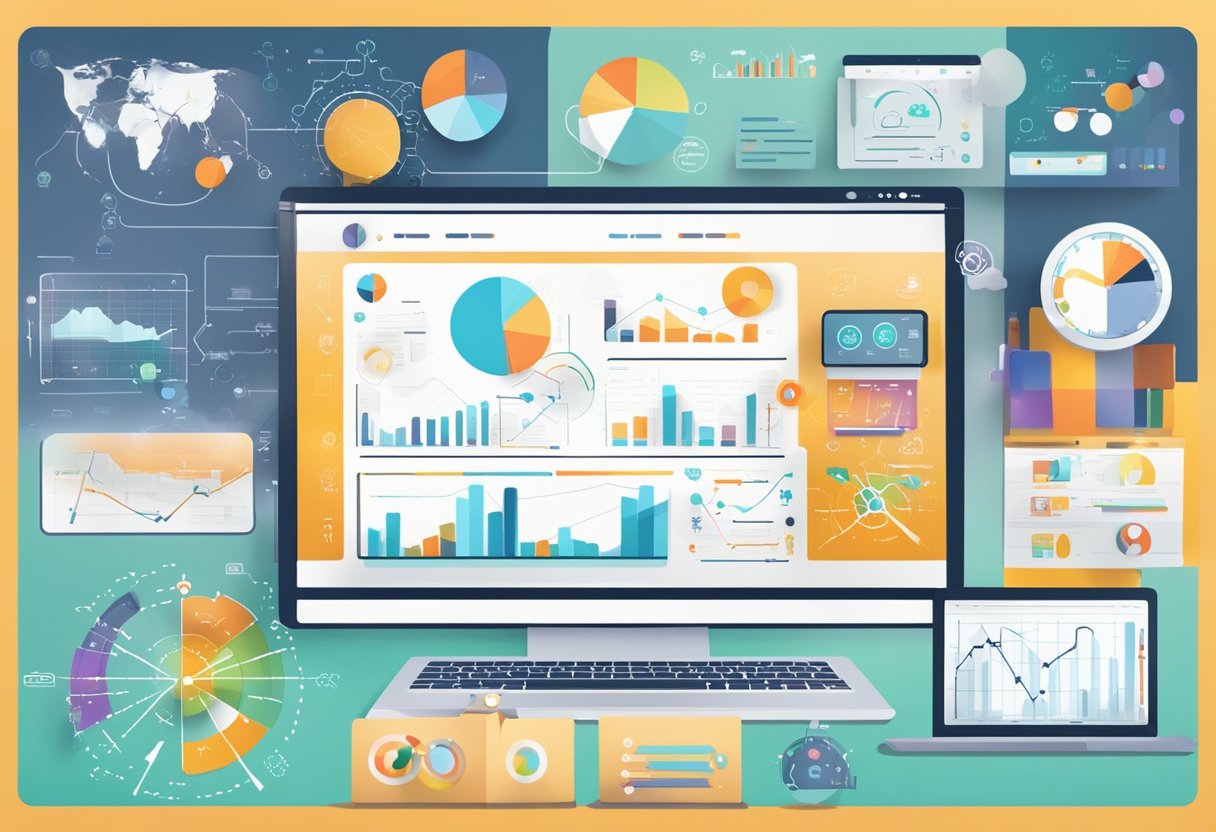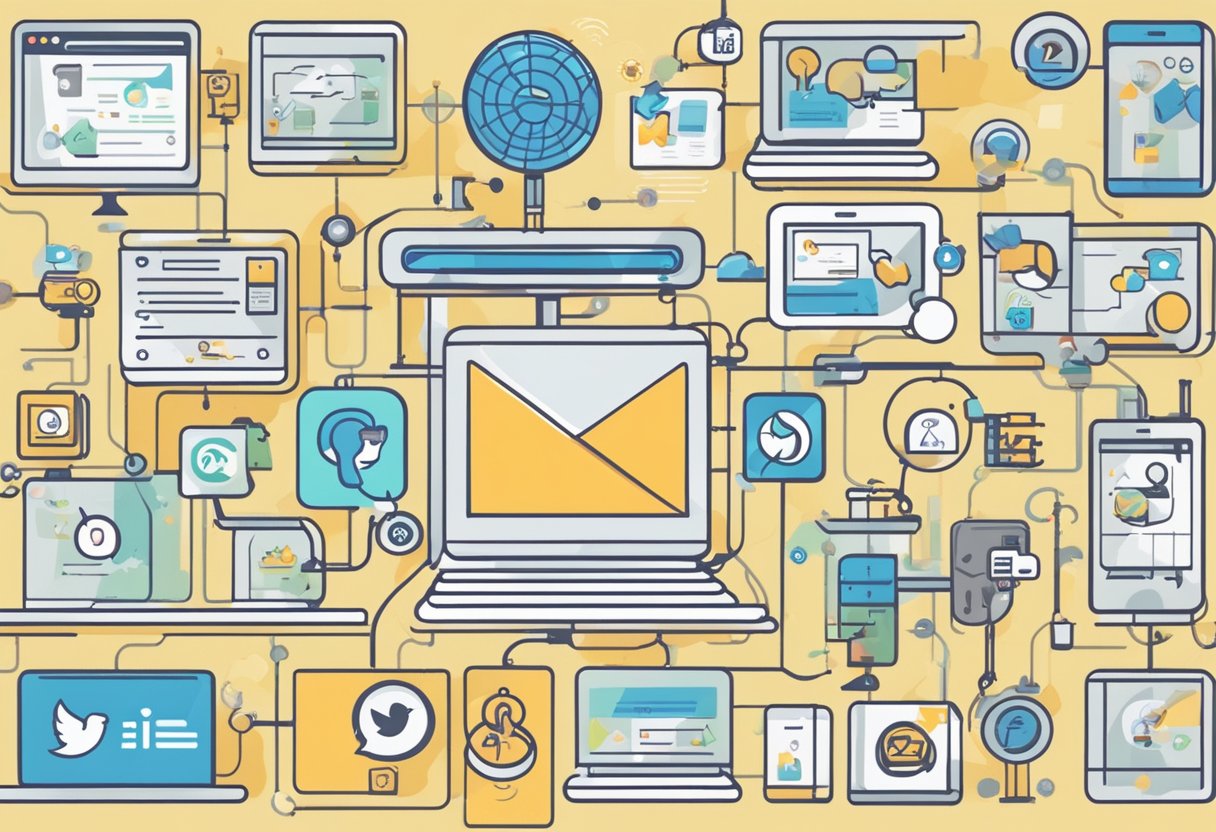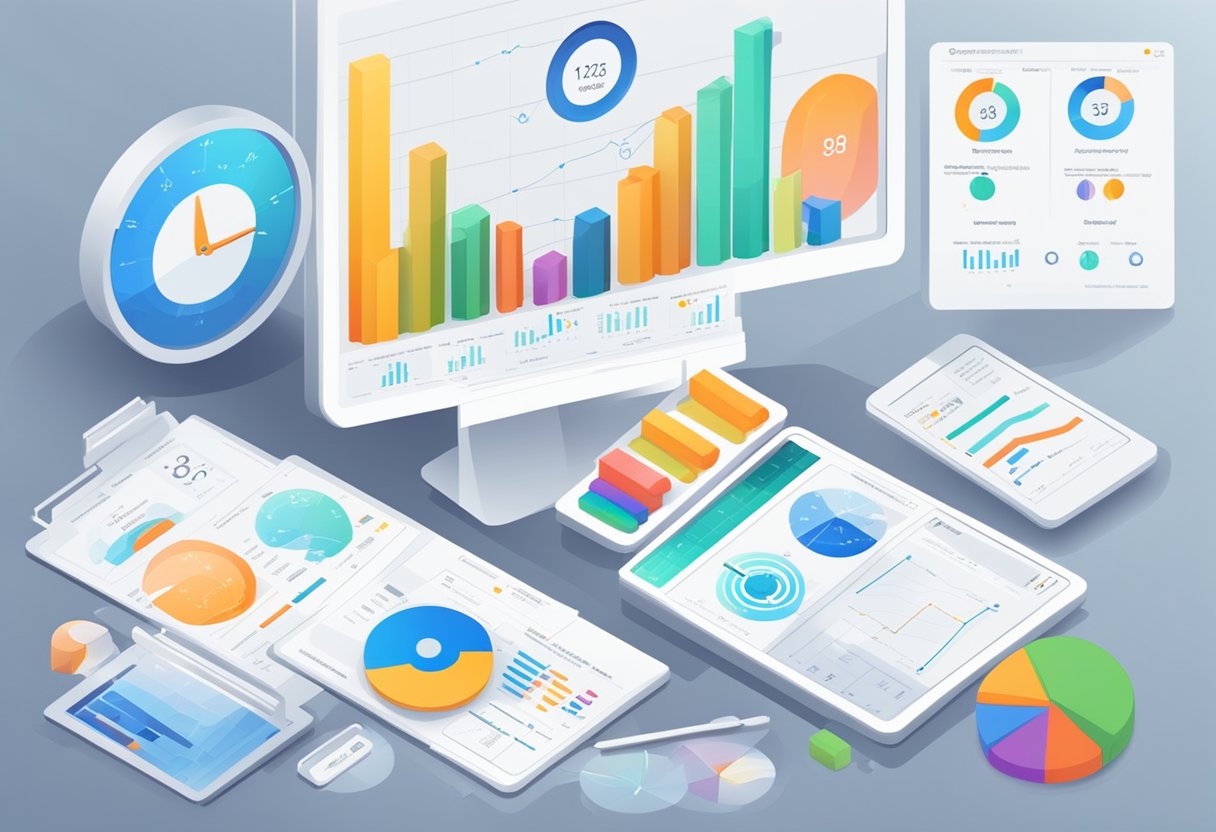What Are the Top Marketing and Automation Trends for Online Businesses?
Marketing and automation trends are constantly evolving, and businesses that fail to keep up with these changes risk being left behind. With the rise of e-commerce and online businesses, it’s more important than ever to stay up-to-date with the latest trends in marketing automation. In this article, we’ll explore some of the key trends that online businesses should be aware of in 2023.

One of the biggest trends in marketing automation this year is the impact of AI on marketing strategies. AI-powered tools and platforms are becoming increasingly sophisticated, allowing businesses to automate a wide range of tasks and processes. This includes everything from lead generation and customer segmentation to personalized content creation and predictive analytics. As AI continues to evolve, it’s likely that we’ll see even more advanced marketing automation solutions emerge in the coming years.
Another important trend in marketing automation is the growing focus on personalization. With consumers becoming increasingly discerning and demanding, businesses need to find ways to tailor their marketing messages to individual customers. This means using data and analytics to gain insights into customer behavior and preferences, and then using that information to deliver highly targeted and personalized marketing messages.
Key Takeaways
- AI is having a major impact on marketing automation, with businesses using advanced tools and platforms to automate a wide range of tasks and processes.
- Personalization is becoming increasingly important in marketing automation, with businesses using data and analytics to deliver highly targeted and personalized marketing messages.
- Omnichannel and social media marketing, improving customer experience, and ROI and benefits of marketing automation are other important trends that businesses should be aware of in 2023.
Marketing Automation Trends in 2023

Marketing automation is an essential tool for online businesses to save time and resources. As the world becomes increasingly digital, companies are investing more in marketing automation to stay ahead of the curve. Here are some of the top marketing automation trends for 2023:
-
Increased Investment in Marketing Automation: The number of marketers investing in marketing automation is expected to increase in 2023. This is due to the growing realization of the value and potential of marketing automation.
-
Omnichannel Marketing: In 2023, businesses will continue to focus on creating a seamless customer experience across all channels. This means that marketing automation tools will need to be able to integrate with a variety of channels, including social media, email, and mobile.
-
Personalized Content: Personalization is becoming increasingly important in marketing automation. In 2023, businesses will need to focus on creating personalized content for their customers to increase engagement and conversions.
-
Chatbots and Conversational Marketing: Chatbots and conversational marketing are becoming more popular in marketing automation. In 2023, businesses will need to focus on creating conversational experiences that are personalized and engaging for their customers.
-
Mobile-First Approach: In 2023, businesses will need to focus on creating a mobile-first approach to marketing automation. This means that marketing automation tools will need to be optimized for mobile devices to provide a seamless experience for customers.
-
User-Quality Data: In 2023, businesses will need to focus on collecting and analyzing user-quality data to improve their marketing automation strategies. This includes data on customer behavior, preferences, and demographics.
-
Lead Capture: Lead capture is an essential component of marketing automation. In 2023, businesses will need to focus on optimizing their lead capture strategies to increase conversions and revenue.
-
Marketing Automation Funnel: In 2023, businesses will need to focus on optimizing their marketing automation funnel to increase efficiency and effectiveness. This includes creating a clear and streamlined process for lead capture, nurturing, and conversion.
-
Social Media Marketing on Autopilot: Social media marketing is an important component of marketing automation. In 2023, businesses will need to focus on automating their social media marketing to save time and resources.
These are some of the top marketing automation trends for 2023. By staying ahead of the curve and implementing these trends, businesses can increase their ROI and stay competitive in the digital marketplace.
Impact of AI on Marketing Automation

Artificial Intelligence (AI) has revolutionized the marketing automation industry by providing businesses with powerful tools to streamline their marketing processes, optimize customer experiences, and increase revenue. AI-powered marketing automation has the ability to analyze large amounts of data, identify patterns, and make predictions, which can help businesses make informed decisions and improve their marketing strategies.
Role of Machine Learning
Machine learning is a subset of AI that focuses on the development of algorithms that can learn from data and make predictions. In marketing automation, machine learning algorithms can analyze customer data and behavior to create personalized experiences and targeted marketing campaigns. For example, machine learning algorithms can be used to analyze customer purchase history and browsing behavior to recommend products or services that are relevant to their interests.
Machine learning can also help businesses optimize their marketing campaigns by predicting which channels and messages are most effective for different customer segments. By analyzing customer engagement data, machine learning algorithms can identify which channels and messages are most likely to lead to conversions and adjust marketing strategies accordingly.
Chatbots and Conversational Marketing
Chatbots are another AI-powered tool that can be used for marketing automation. Chatbots are computer programs that can simulate human conversation and can be used to interact with customers in real-time. Chatbots can be used to answer customer inquiries, provide product recommendations, and even complete transactions.
Conversational marketing is a marketing strategy that uses chatbots and other conversational tools to engage with customers in real-time. By using chatbots to interact with customers, businesses can provide personalized experiences and build stronger relationships with their customers. Conversational marketing can also help businesses improve customer satisfaction and increase revenue by providing customers with a seamless and convenient shopping experience.
In conclusion, AI-powered marketing automation has the potential to revolutionize the way businesses approach marketing. By leveraging the power of AI, businesses can streamline their marketing processes, optimize customer experiences, and increase revenue. Machine learning and chatbots are just two examples of AI-powered tools that can be used for marketing automation, and businesses that embrace these technologies are likely to see significant benefits in the years to come.
Personalization in Marketing Automation
https://www.youtube.com/watch?v=XLRU2wg3yjo&embed=true
Personalization is a crucial aspect of marketing automation that has been gaining more and more attention in recent years. By tailoring marketing messages to individual customers, businesses can increase engagement, improve customer experience, and ultimately drive more sales. In this section, we will discuss two important sub-topics of personalization in marketing automation: hyper-personalization and personalized content.
Hyper-Personalization
Hyper-personalization is a relatively new concept that takes personalization to the next level. While traditional personalization involves segmenting customers into groups and tailoring messages to those groups, hyper-personalization involves creating unique messages for each individual customer. This can be achieved by leveraging customer data such as browsing behavior, purchase history, and social media activity to create highly targeted messages.
One example of hyper-personalization is Netflix's recommendation engine, which uses machine learning algorithms to suggest movies and TV shows based on individual viewing history. By tailoring recommendations to each individual user, Netflix is able to keep users engaged and reduce churn.
Another example of hyper-personalization is Amazon's product recommendations, which are based on a customer's purchase history, browsing behavior, and search history. By suggesting products that are highly relevant to each individual customer, Amazon is able to increase customer loyalty and drive more sales.
Personalized Content
Personalized content is another important aspect of marketing automation. By tailoring content to individual customers, businesses can increase engagement and improve customer experience. This can be achieved by using customer data such as browsing behavior, purchase history, and demographic information to create highly targeted content.
One example of personalized content is email marketing. By segmenting customers into different groups based on their interests and behavior, businesses can create highly targeted email campaigns that are more likely to be opened and clicked on. For example, a clothing retailer might send a different email campaign to customers who have previously purchased men's clothing versus customers who have purchased women's clothing.
Another example of personalized content is website personalization. By using cookies and other tracking technologies, businesses can create a personalized experience for each individual user. For example, a travel website might show different hotel recommendations to users who have previously searched for beach vacations versus users who have searched for ski vacations.
In conclusion, personalization is a crucial aspect of marketing automation that can help businesses increase engagement, improve customer experience, and drive more sales. By leveraging customer data and using targeted messaging and content, businesses can create highly personalized experiences for each individual customer.
Omnichannel and Social Media Marketing

Online businesses can benefit from adopting an omnichannel approach to marketing. Omnichannel marketing refers to the use of multiple channels to interact with customers. The goal is to create a seamless experience across all channels, so customers can engage with the brand on their terms.
One of the most important channels for online businesses is social media. Social media marketing involves using social media platforms to promote products and services, communicate with customers, and build brand awareness.
Automated Social Media Marketing
Automated social media marketing is an effective way for online businesses to reach their target audience on social media platforms. This approach involves using software tools to automate repetitive tasks such as posting content, scheduling posts, and analyzing performance metrics.
Automated social media marketing can save businesses time and resources, while also ensuring that their social media presence remains active and engaging. However, it's important to strike a balance between automation and personalization. Customers value authenticity and may be put off by overly robotic interactions.
Short-Form Video Marketing
Short-form videos are becoming increasingly popular on social media platforms such as TikTok, Instagram, and YouTube. These videos are typically less than a minute long and can be used to showcase products, provide tutorials, or share behind-the-scenes glimpses of the business.
Short-form video marketing can be an effective way to build brand awareness and engage with customers. However, it's important to ensure that the videos are high-quality and relevant to the target audience.
Overall, online businesses can benefit from adopting an omnichannel approach to marketing and leveraging social media platforms to connect with customers. Automated social media marketing and short-form video marketing are two trends that can help businesses stay competitive in the online marketplace.
Improving Customer Experience with Automation

Online businesses are constantly looking for ways to improve their customer experience. One way to achieve this is by leveraging automation to streamline processes and provide personalized experiences. In this section, we will explore two areas where automation can enhance the customer experience: lifecycle marketing and customer retention.
Lifecycle Marketing
Lifecycle marketing is the process of guiding customers through the various stages of their journey with a brand. This includes everything from initial awareness to post-purchase support. Automation can help businesses deliver targeted messages to customers at each stage of the journey, increasing engagement and conversion rates.
One way to implement lifecycle marketing automation is through email campaigns. By creating automated email sequences triggered by specific actions or behaviors, businesses can provide relevant content and offers to customers at the right time. For example, a customer who has abandoned their cart could receive a personalized email with a discount code to encourage them to complete their purchase.
Another way to improve the customer experience through automation is by providing personalized recommendations. Using data such as purchase history and browsing behavior, businesses can create targeted product recommendations for each customer. This not only enhances the customer experience but also increases the likelihood of repeat purchases.
Customer Retention
Customer retention is a critical aspect of any online business. It is more cost-effective to retain existing customers than to acquire new ones, and loyal customers are more likely to make repeat purchases and recommend the brand to others. Automation can help businesses improve customer retention by providing personalized experiences and support.
One way to use automation for customer retention is through loyalty programs. By automating the tracking and rewarding of customer loyalty, businesses can incentivize repeat purchases and increase customer engagement. For example, a customer who reaches a certain spending threshold could receive a personalized discount code or free gift.
Another way to improve customer retention through automation is by providing proactive support. By using chatbots or other automated tools, businesses can provide instant support to customers who have questions or issues. This not only improves the customer experience but also reduces the workload for customer support teams.
In conclusion, automation can be a powerful tool for improving the customer experience in online businesses. By implementing lifecycle marketing and customer retention automation strategies, businesses can provide personalized experiences and support that increase engagement, retention, and revenue.
ROI and Benefits of Marketing Automation

Marketing automation is a powerful tool that can help online businesses increase their ROI and reap numerous benefits. Here are some of the ways that marketing automation can help businesses achieve their goals.
Lead Generation and Conversions
Marketing automation can help businesses generate more leads and convert them into paying customers. By automating processes such as email marketing, lead nurturing, and lead scoring, businesses can save time and resources while still reaching their target audience with personalized messages. This can lead to higher conversion rates and increased revenue.
In fact, according to Nucleus Research, marketing automation returns an average of $5.44 for every dollar spent on it. This means that businesses can see a significant return on investment by implementing marketing automation tools.
Qualified Leads and CRM
Marketing automation can also help businesses identify and prioritize qualified leads, allowing them to focus their efforts on the leads that are most likely to convert. By using lead scoring and other automation tools, businesses can track the behavior and engagement of their leads and use that data to determine which leads are most likely to become customers.
In addition, marketing automation can help businesses manage their customer relationships more effectively. By using a CRM system that integrates with marketing automation tools, businesses can track customer interactions across multiple channels and use that data to provide personalized experiences for their customers.
Overall, marketing automation can provide numerous benefits for online businesses, including increased ROI, improved lead generation and conversion rates, and more effective customer relationship management. By leveraging the power of automation, businesses can streamline their marketing processes and achieve their goals more efficiently and effectively.
Challenges and Solutions in Marketing Automation
Third-Party Cookies and First-Party Data
One of the biggest challenges facing online businesses in 2023 is the phasing out of third-party cookies. Third-party cookies have been a staple of online advertising for years, allowing advertisers to track users across the web and serve them targeted ads. However, with growing concerns about user privacy, major web browsers like Google Chrome and Mozilla Firefox have announced plans to phase out third-party cookies. This has left many marketers scrambling to find new ways to target users and measure the effectiveness of their campaigns.
One solution to this problem is to focus on first-party data. First-party data is data that businesses collect directly from their own customers, such as email addresses, purchase history, and website behavior. By leveraging this data, businesses can create more personalized and targeted campaigns without relying on third-party cookies.
Budget and Ease of Use
Another challenge facing online businesses is the budget and ease of use of marketing automation tools. While marketing automation can be incredibly powerful, it can also be expensive and complex to implement. Many businesses struggle to find the resources to invest in marketing automation, or to find tools that are easy enough to use without extensive training.
One solution to this problem is to look for marketing automation tools that are designed specifically for small and medium-sized businesses. These tools are often more affordable and easier to use than enterprise-level solutions, while still providing many of the same benefits. Additionally, businesses can look for tools that offer free trials or demo versions, allowing them to test the software before committing to a purchase.
Overall, while there are certainly challenges facing online businesses in 2023 when it comes to marketing automation, there are also solutions available. By focusing on first-party data and finding affordable, easy-to-use tools, businesses can continue to grow and thrive in the ever-changing digital landscape.
Future of Marketing Automation
Marketing automation is an essential tool for online businesses looking to streamline their marketing efforts. In this section, we will discuss the future of marketing automation and how it is expected to evolve in the coming years.
Global Marketing Automation Market Size
According to a report by MarketsandMarkets, the global marketing automation market size is expected to grow from $3.3 billion in 2020 to $6.4 billion by 2025, at a Compound Annual Growth Rate (CAGR) of 13.9% during the forecast period. The report attributes this growth to the increasing demand for digital marketing automation, the need for personalized marketing, and the rising adoption of customer-centric marketing strategies.
Marketing Automation Software
Marketing automation software is expected to become more sophisticated and user-friendly in the coming years. The software will be able to handle more complex tasks and provide more insights into customer behavior. Some of the trends that are expected to shape marketing automation software in the future include:
-
Artificial Intelligence (AI): AI-powered marketing automation software will become more prevalent, allowing businesses to automate complex tasks, such as lead scoring, content creation, and personalized messaging.
-
Omnichannel Marketing: Marketing automation software will continue to support omnichannel marketing, allowing businesses to create a seamless customer experience across multiple channels, including email, social media, and mobile.
-
Mobile-first Approach: As mobile usage continues to grow, marketing automation software will need to be optimized for mobile devices. This will enable businesses to reach customers wherever they are and provide a better user experience.
-
Personalization: Personalization will remain a key trend in marketing automation software, allowing businesses to create tailored messages and experiences for their customers.
-
Chatbots: Chatbots will continue to be a popular tool for businesses looking to automate customer service and support. As AI technology improves, chatbots will become more sophisticated and better able to handle complex customer queries.
In conclusion, the future of marketing automation is bright, with the market expected to grow significantly in the coming years. Businesses that embrace marketing automation software and stay up-to-date with the latest trends will be better positioned to succeed in the digital marketplace.
Conclusion
In summary, marketing automation is a crucial way for online businesses to save time and money. By automating simple processes, companies can free up their teams to focus on more critical tasks. As we move further into 2023, there are several key trends that businesses should keep in mind when it comes to marketing automation.
Firstly, user-quality data is becoming increasingly important. By collecting and analyzing data on user behavior, companies can create more targeted and personalized marketing campaigns that are more likely to resonate with their audience.
Secondly, lead capture is another key trend to watch. By creating effective lead capture forms and ensuring that they are prominently displayed on their website, businesses can increase their chances of converting visitors into leads.
Thirdly, the emergence of omnichannel marketing means that businesses need to be present on multiple channels and platforms to reach their audience effectively. By providing a seamless experience across all channels, companies can build stronger relationships with their customers and increase their chances of success.
Fourthly, the marketing automation funnel is becoming increasingly important. By creating a clear and well-defined funnel, businesses can ensure that their marketing efforts are targeted and effective.
Fifthly, personalized content for users is essential. By tailoring content to the specific needs and interests of individual users, companies can increase engagement and build stronger relationships with their audience.
Sixthly, chatbots and conversational marketing are becoming more prevalent. By using chatbots to automate simple interactions with customers, businesses can improve their customer service and free up their teams to focus on more complex tasks.
Seventhly, social media marketing on autopilot is becoming more common. By automating social media posts and interactions, companies can save time and ensure that they are consistently engaging with their audience.
Lastly, a mobile-first approach is essential in today's mobile-first world. By optimizing their marketing efforts for mobile devices, businesses can ensure that they are reaching their audience where they are most likely to be.
Overall, by keeping these trends in mind and staying up-to-date with the latest developments in marketing automation, online businesses can stay ahead of the curve and achieve greater success in 2023 and beyond.
Frequently Asked Questions

How is marketing automation adoption affecting online businesses in 2023?
Marketing automation adoption is rapidly increasing among online businesses in 2023. By automating repetitive tasks, businesses can save time and resources while improving the customer experience. Marketing automation can help businesses to personalize their marketing efforts, improve lead generation, and increase conversions.
What are the key trends in omnichannel marketing for online businesses?
Omnichannel marketing is an emerging trend in 2023 that online businesses should be aware of. It involves creating a seamless customer experience across all channels, including social media, email, mobile, and in-store. The key trends in omnichannel marketing include hyper-personalization, conversational marketing, and a mobile-first approach.
What are the current trends for digital marketing and eCommerce in 2023?
Digital marketing and eCommerce are constantly evolving, and businesses need to keep up with the latest trends to stay competitive. In 2023, the key trends for digital marketing and eCommerce include voice search optimization, visual search, social media marketing, and video marketing.
What are the emerging eCommerce trends in 2023 that online businesses should be aware of?
Emerging eCommerce trends in 2023 that online businesses should be aware of include augmented reality, virtual reality, and artificial intelligence. These technologies can help businesses to create immersive shopping experiences that engage customers and increase conversions.
What are the top marketing and automation strategies for online businesses in 2023?
The top marketing and automation strategies for online businesses in 2023 include personalization, lead nurturing, email marketing, and chatbots. These strategies can help businesses to improve the customer experience, generate more leads, and increase conversions.
How is the future of marketing automation shaping up for online businesses in 2023?
The future of marketing automation looks promising for online businesses in 2023. With the emergence of new technologies such as artificial intelligence and machine learning, businesses can automate more tasks and create more personalized experiences for their customers. As businesses continue to adopt marketing automation, they will be able to improve their marketing efforts, generate more leads, and increase conversions.
Tim Moseley
